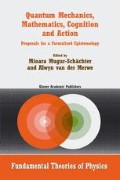Abstract
It is first brought into evidence that such fundamentally different domains of research as physics, biology, and language sciences, present—with remarkable unity—the same tendency to base their theoretical constructs upon “bricks,” from where “information” is carried upwards by a one-way flow of causal determinations. It is then shown that in all these three domains, such theoretical constructs are far to be supported by the present data and conceptions. This brings into evidence the interest of a formalized epistemology, enabling the general mould in which are cast our representations of “reality” to be explicitly reconsidered in keeping with these data and conceptions.
This work has been supported in part by a DGA grant No. 96070.
Access this chapter
Tax calculation will be finalised at checkout
Purchases are for personal use only
Preview
Unable to display preview. Download preview PDF.
References
E. Andreewsky, ed., Systémique et Cognition (Paris, Dunod, 1991).
E. Andreewsky, “Quelques questions inhérentes è la compréhension du langage,” in J.-L. Le Moigne, ed., Intelligence des Mécanismes, Mécanismes de ľIntelligence (Fayard, Paris, 1986).
E. Andreewsky and X. Seron, “Implicit processing of grammatical rules in a classical case of agrammatism,” Cortex XI, 379–390 (1975).
M. Bitbol, Mécanique Quantique; Une Introduction Philosophique (Flammarion, Paris, 1996).
M. Bitbol, Physique et Philosophie de ľEsprit (Flammarion, Paris, 2000).
M. Coltheart, K. Patterson, and J. Marshall, eds., Deep Dyslexia (Routledge & Kegan Paul, London, 1980).
F. Gonseth, “Le référentiel, univers obligé de médiatisation,” Dialectica (1975).
L. Henderson, “Word recognition: A tutorial review,” in M. Caltheart, ed., Attention and Performance XII: The Psychology of Reading (1987), pp. 171–200.
G. Lakoff and M. Johnson, Metaphors We Live By (University of Chicago Press, Chicago, 1980).
J.-L. Le Moigne, “Sur les fondements épistémologiques de la science de la Cognition,” in E. Andreewsky, ed., Systémique et Cognition (Dunod, Paris, 1991).
A. R. Luria, Basic Problems of Neurolinguistics (Mouton, The Hague, 1976).
M. Mugur-Schächter, “Les leçons de la mécanique quantique — vers une épistémologie formelle,” Débat 94, 169–192 (1997).
C. Parisse and E. Andreewsky, “Dynamique lexicale et cognition,” MCX/APC, la Dialectique du Savoir et du Dire (Poitiers, 1997).
Ch. S. Peirce, Le Raisonnement et la Logique des Choses (Lectures of 1898; Cerf, Paris, 1995).
J. Piaget and R. Garcia, Psychogenèse et Histoire des Sciences (Flammarion, Paris, 1983).
E. Schrödinger, Ľesprit et la Matière (Seuil, Paris, 1990).
B. Shanon, The Presentational and the Representational (Harvester Wheatsheaf, New-York, 1993).
J. Stewart and E. Andreewsky, “From information to autonomy: Analogies between biology and the language sciences,” Kybernetes 21 (5), 15–32 (1992).
L. S. Vygotsky, Pensée et Langage, trans. by F. Sève (Paris, Messidor, 1985).
C. H. Waddington, Principles of Embryology (Allen & Unwin, London, 1956).
T. Winograd and F. Flores, Understanding Computers and Cognition: A New Foundation for Design (Ablex, Norwood, NJ, 1986).
Author information
Authors and Affiliations
Editor information
Editors and Affiliations
Rights and permissions
Copyright information
© 2003 Kluwer Academic Publishers
About this chapter
Cite this chapter
Andreewsky, E. (2003). Complexity of the “Basic Unit” of Language: Some Parallels in Physics and Biology. In: Mugur-Schächter, M., van der Merwe, A. (eds) Quantum Mechanics, Mathematics, Cognition and Action. Fundamental Theories of Physics, vol 129. Springer, Dordrecht. https://doi.org/10.1007/0-306-48144-8_10
Download citation
DOI: https://doi.org/10.1007/0-306-48144-8_10
Publisher Name: Springer, Dordrecht
Print ISBN: 978-1-4020-1120-7
Online ISBN: 978-0-306-48144-4
eBook Packages: Springer Book Archive

